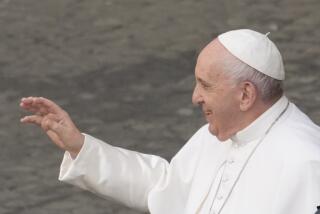Lutherans, Catholics Near Accord on Issue That Sparked the Reformation
- Share via
More than 450 years after a rancorous split that spawned mutual condemnations and cost untold lives in religious wars, Lutherans and Roman Catholics are poised to declare that the central issue leading to the 16th century Protestant Reformation no longer divides the two faiths.
The key step will come next week, when leaders from the world’s Lutheran churches begin meeting in Geneva, where they are expected to endorse a Roman Catholic-Lutheran “Joint Declaration on the Doctrine of Justification”--a key Christian concept on how people are saved.
Differences with the Catholic Church in the 16th century over the issue--often simply formulated as “faith vs. works”--propelled Martin Luther, a German monk, to post his 95 theses challenging church teachings and practices on the door of Castle Church in Wittenberg, Germany. Ultimately, the challenge led to the division of Europe into Catholic and Protestant camps and religious wars that lasted for decades.
The issue at the time was the question of how people are saved. Luther, appalled by certain church practices, stressed that salvation comes from faith. The Catholic Church, however, argued that how a person acted--”works,” in the vocabulary of the era--had something to do with “justification,” or salvation.
The historical situation was vividly described by Cardinal Edward Cassidy, head of the Vatican’s Pontifical Council for the Promotion of Christian Unity, at last year’s Lutheran World Federation Assembly in Hong Kong. Luther, Cassidy said, spoke out at a “difficult time,” when the church was using indulgences--sold to believers as a means of gaining salvation--to finance the building of churches.
“At that historical moment, someone was needed to stress that it wasn’t by what we do that we are saved,” Cassidy said. “Luther brought these things up in such a striking way that he made it clear we were in trouble.”
*
Now, the two sides are ready to say that in the contemporary teaching of each church they see authentic Christian faith. The 16th century division on the issue--including the condemnations each side hurled at the other during the increasingly bitter dispute--no longer exists, both churches say.
The Lutheran leaders meeting in Geneva from Monday to June 17 represent the 224 member churches of the Lutheran World Federation. They will look at the responses to the proposed joint declaration from their member churches and determine whether the federation should sign the 45-paragraph statement, which says that “a consensus in basic truths of the doctrine of justification exists between Lutherans and Catholics.”
*
Also included is a paragraph declaring that “the doctrinal condemnations of the 16th century, insofar as they relate to the doctrine of justification, appear in a new light: The teaching of the contemporary Lutheran churches does not fall under the relevant condemnations of the Council of Trent, and the corresponding condemnations in the Lutheran Confessions do not apply to the contemporary Roman Catholic Church.”
The world’s largest Lutheran church, the 7.6-million-member Church of Sweden, has agreed to the declaration, as has the 5.2-million-member Evangelical Lutheran Church in America.
But other major Lutheran bodies, including the St. Louis-headquartered Lutheran Church-Missouri Synod, which is not a member of the federation, are not taking part in the process.
If the document wins approval, the Vatican would affirm it, according to high-ranking Roman Catholic officials, and a joint festive signing ceremony would be held sometime before the end of the year.
The proposed declaration is the product of more than 30 years of officially sanctioned theological dialogue between Lutherans and Roman Catholics. The talks drew on new biblical and historical studies in an effort to overcome the historic divisions.
“Developments have taken place which not only make possible but also require the churches to examine the divisive questions and condemnations and see them in a new light,” the declaration says. “Our common way of listening to the word of God in Scripture has led to such new insights.”
In a key passage, the declaration affirms: “Together we confess: By grace alone, in faith in Christ’s saving work and not because of any merit on our part, we are accepted by God and receive the Holy Spirit, who renews our hearts while equipping and calling us to good works.”
Of the 66 Lutheran church bodies that had officially responded by early May, just four--the Malagasy Lutheran Church, the Lutheran Church of Nigeria, the Estonian Evangelical Lutheran Church Abroad and the Kinki Evangelical Lutheran Church in Japan--had rejected the declaration. Two others--the Lutheran Church of Liberia and the Evangelical Lutheran Church in Denmark--called for lifting the condemnations but rejected the declaration’s claim that a “consensus” existed on the crucial doctrine.
In Germany, the home and heart of the Reformation, the proposed declaration has generated fierce debate. In January, about 140 German theologians issued a rare joint statement calling for rejection of the declaration on the grounds that no real consensus existed on the question of justification and that the statement was unlikely to move the Vatican into closer relations with Lutheran churches.
Still, no German Lutheran church has rejected the proposal.
And even supporters of the proposal, although arguing that it would be a major positive development in the ecumenical landscape, note that major issues--female priests, the authority of the pope and divergent ethical stands--continue to be high hurdles blocking closer Lutheran-Roman Catholic relations.
More to Read
Sign up for Essential California
The most important California stories and recommendations in your inbox every morning.
You may occasionally receive promotional content from the Los Angeles Times.













